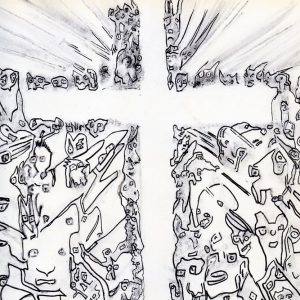Le Poème de l’extase
“Conditioned to ecstasy, the poet is like a gorgeous unknown bird mired in the ashes of thought. If he succeeds in freeing himself, it is to make a sacrificial flight to the sun. His dreams of a regenerate world are but the reverberations of his own fevered pulse beats. He imagines the world will follow him, but in the blue he finds himself alone. Alone but surrounded by his creations; sustained, therefore, to meet the supreme sacrifice. The impossible has been achieved; the duologue of author with Author is consummated. And now forever through the ages the song expands, warming all hearts, penetrating all minds. At the periphery the world is dying away; at the center it glows like a live coal. In the great solar heart of the universe the golden birds are gathered in unison. There it is forever dawn, forever peace, harmony and communion. Man does not look to the sun in vain; he demands light and warmth not for the corpse which he will one day discard but for his inner being. His greatest desire is to burn with ecstasy, to commerge his little flame with the central fire of the universe. If he accords the angels wings so that they may come to him with messages of peace, harmony and radiance from worlds beyond, it is only to nourish his own dreams of flight, to sustain his own belief that ;he will one day reach beyond himself, and on wings of gold. One creation matches another in essence they are all alike. The brotherhood of man consists not in thinking alike, nor in acting alike, but in aspiring to praise creation. The song of creation springs from the ruins of earthly endeavor. The outer man dies away in order to reveal the golden bird which is winging its way toward divinity. The operative word here is “ecstasy”. Scriabin’s music has that far-off cosmic itch. Divinely fouled up. All fire and air are his. It was like a bath of ice; co***** and rainbows . . .”
— Henry Miller, The Time of the Assassins: A Study of Rimbaud.
“The Spirit
Winged by the thirst for life,
Takes flight
On the heights of negation.
There in the rays of his dream
Arises a magic world
Of marvelous images and feelings.
The Spirit playing.
The Spirit longing.
The Spirit with fancy creating all,
Surrenders himself to the bliss of love. . . .
I call you to life, mysterious forces!
Drowned in the obscure depths
Of the creative spirit, timid
Embryos of life, to you I bring audacity! . . .
I am a moment illuminating eternity….I am affirmation…I am ecstasy.”
“When you listen to Ecstasy,” Scriabin told his friend Ivan Lipaev, “look straight into the eye of the sun!”
Listening to the BBC Philharmonic perform Scriabin’s ‘Poem of Ecstasy’.
The rhapsodic effusions, exorbitantly rich colours, synaesthesiac musical thought-forms rising above the orchestra.
Henry Miller wrote after hearing the poem:
“For weeks I went about in a trance. Something had happened to me. Every time a thought seized me a little door would open inside my chest, and there, in this comfy little nest sat a bird, the sweetest gentlest bird imaginable. ‘Think it out!’ he would chirp. Think it out to the end!’ And I would, by God. Never any effort involved. Like an étude gliding off a glacier in the movie Barfly, Poem of Ecstasy can be heard in one.”
Harry Matthews
un poète et peintre
